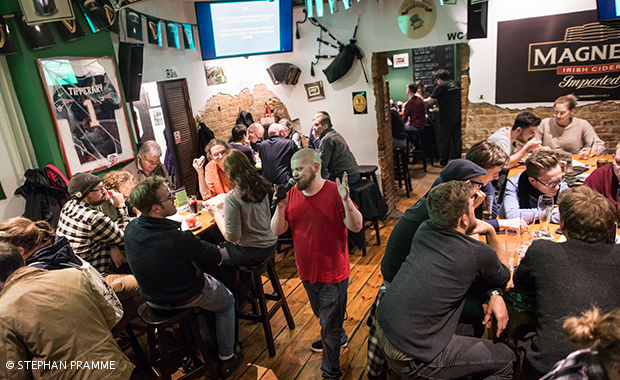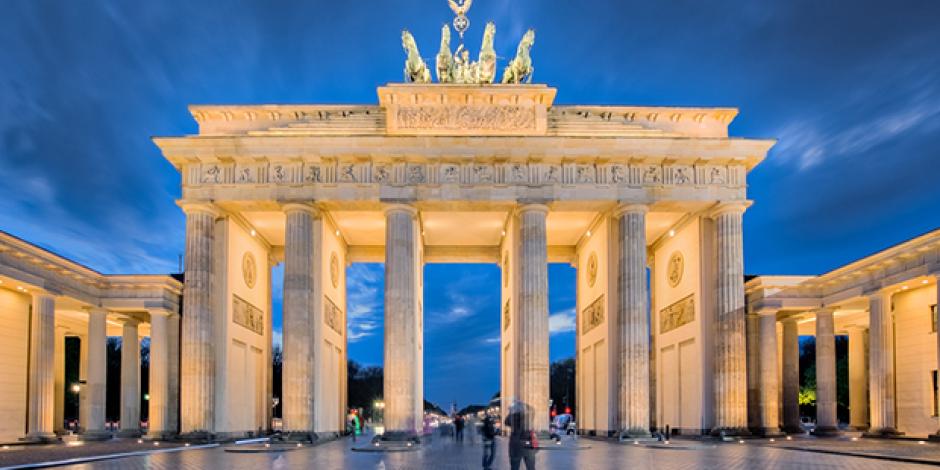Germany’s capital of Berlin is known for its international identity. As a result, British people here to mergeverschmelzenmerge smoothly into the flow of nationalities that walk its pavement (UK)Gehsteigpavements. But Brits are fond of sth.von etw. angetan sein, etw. gerne habenfond of their home comforts and good at making sure that they are available — you might just have to look a little harder to find them here. When you do, you’ll see that they’ve been enthusiastically adopted by Berliners, too.
A taste of Britain…
Identity is often about food, about what tasted good when we were children. Dale Carr knows all about the relationship between eating and memory. She’s been to runhier: führen, leitenrunning English food and gift stores in Berlin for more than two decades. Broken English is located in Kreuzberg at Körtestrasse 10 and in Charlottenburg at Leonhardtstrasse 23, where Carr sells all things British, ranging from Marmitewürziger Brotaufstrich aus HefeextraktMarmite to sconeengl. Teegebäckscones and clotted cream (UK)Streichrahm, fettreiche, dicke Sahneclotted cream. You’ll also find everything you need for a good English breakfast, including teapots. “Think of us as a crosshier: Mischungcross between a co-op and a National Trust store,” says Carr.
Her customers are not just Brits. People who have spent a holiday in the Yorkshire Dales or on Cornwall’s beaches come in to ask for Cadbury chocolate or PG Tips tea. And as for aromas that remind you of home? Imperial Leather soap may not be everybody’s idea of fine living, but for me, at least, it comes with memories of sitting on the saddle bar of my father’s bicycle when I was small, riding home after a walk in the woods — to a cup of Cadbury hot chocolate and a digestive biscuit (UK)Vollkornkeksdigestive biscuit, both of which Carr also sells.
Think of us as a cross between a co-op and a National Trust store
Two of the more surprising itemSache, Stückitems on Dale Carr’s bestseller list are the ladies’ (half pint) and pint (UK)Pint- (0,568 l)pint beer glasses. Sitting in the saloon or bar area of a pub “to nursehier: bedächtig trinkennursing a pint” is something many of us associate with being in the UK. But for some people, going to the pub is about more than just socializing. The pub quiz is another great British institution, which brings the punter (UK, ifml.)Kunde/-inpunters out of the dark corners to test their general knowledge in the bright light of competition.
…at an Irish pub (quiz)
Several of Berlin’s Irish pubs to drawhier: anlockendraw Brits and others to regularly held pub quizzes. Our favourite takes place every Monday at The Tipperary, an Irish pub located at Triftstraße 58 in Berlin’s Wedding district. Sean Englishby, who organizes the quiz, says that a surprising number of Germans like to to participateteilnehmenparticipate, alongsideSeite an Seite mitalongside English, Dutch, Indians and many more nationalities. Mixed teams are most to be likely to do sth.etw. wahrscheinlich tunlikely to succeed, says Englishby, as he tells me how it works.

About 15 teams with a maximum of seven participants fit into The Tipperary on Monday nights. There are five rounds of questions from categories such as entertainment, sports and history. The sixth round is a picture round. All questions appear as part of a Power Point presentation shown on several screens. Teams note their answers on a piece of paper and a neighbouring team to gradeeinstufen, benotengrades the answers.
Englishby keeps an eye on the scores and, at the end of the evening, the winning team takes home a bottle of whisky. It’s normally about 11 o’clock by now and time for the jackpot round. This works like a lottery. Each team puts five euros into the pot at the start of the evening and, if any team manages to answer all four of the difficult jackpot questions, they take home all the money that has to accumulatesich ansammelnaccumulated since the last jackpot win. The largest sum, says Englishby, was €1,100. But to win that, teams need to know the answer to questions like: “Who invented the Hovercraft?” (Answer: English engineer Christopher Cockerell, 1910–99)

Ein britische Pubquiz in Aktion: Das Babbel Magazin, unser Kooperationspartner für dieses Thema, hat einen Pubquiz-Abend in Berlin besucht und auf Video festgehalten.
Englishby is in his late twenties and comes from Dundalk in County Louth, Ireland. He’s lived in Wedding for about six years and loves the district’s community feeling. For him, the pub quiz is about ritual. Not everybody finds his or her way around a new city quickly, and pub quizzes allow people to socialize in a special context, away from their everyday lives.
Cricket, anybody?
And while we’re on the subject of rituals, Berlin is also home to one of the most ritualized of all British pastimeFreizeitbeschäftigungpastimes. If you’ve ever spent an afternoon watching 22 men (or women) go through an elaboratekompliziertelaborate dance involving batSchläger; schlagenbats, some running and one small, very hard white ball, you’ll know what we mean: cricket.
The history of the sport in Berlin goes back to the 1860s. Things became rather quiet around the “English sport” in the 1920s and 30s, but to pick uphier: an Fahrt gewinnenpicked up after 1945 with the presence of the Allied Forces. By the 1980s, there were three civilian teams in Berlin. In 1985, a fourth team was formed, by Bob Sleigh, who placed an advert in a local newspaper under the headingÜberschrift, Titelheading: “Cricket, anybody?”
In the early years, the team called itself The Refugees, and most games were played against members of the British military. After 1989, and reunificationWiedervereinigungreunification the following year, the team renamed itself the Berlin Cricket Club (BCC). It has been an official German sports club since 1995, playing in the regional East German Cricket League.

Alexis Smith, from Lincolnshire, England, came to Berlin in 2015 and joined the BCC, which plays at the Maifeld, part of the Olympic Stadium complex. The trouble with playing in Germany, says Smith, is the lackMangellack of suitable grounds. He explained that the BCC plays what is known as 50/50 cricket. This is a simplified and quicker version of the cricket played at London’s Oval or Lords grounds. Each team has only 50 overs (one set of six to bowlhier: werfenbowled balls) to score as many runs as possible. Once those overs have been bowled and the first team has scored its runs, the second team comes on to bat and the first goes out to field — after tea and refreshmentErfrischung, Imbissrefreshments, of course.
BCC players are an international mix of Europeans, Asians, people from the Caribbean (mainly Jamaicans) and the Antipodes — with a number of young Afghans involved, as well: Afghan refugees learned the game during exile in Pakistan and took the game back to Afghanistan after the fall of the Taliban. Even when it comes to this most English of sports, it’s fair to say that cricket plays an integrative role in a city with a large migrant population. Come to the Maifeld and watch the BCC play, and this feeling of tolerance — and passion — is what you’ll take home with you.
As the largest and most cosmopolitan German city, Berlin’s British scene is all about finding places to to indulge in sth.etw. genießenindulge in British pastimes. Now and then, you might even find a Brit indulging alongside you.
Related articles
Explore this topic further with our piecehier: Artikelpiece on British communities in Hamburg, or take a look at the selection of articles in our US & UK in Germany section.
Hamburg, Germany’s most British city
More articles in our US & UK in Germany section


